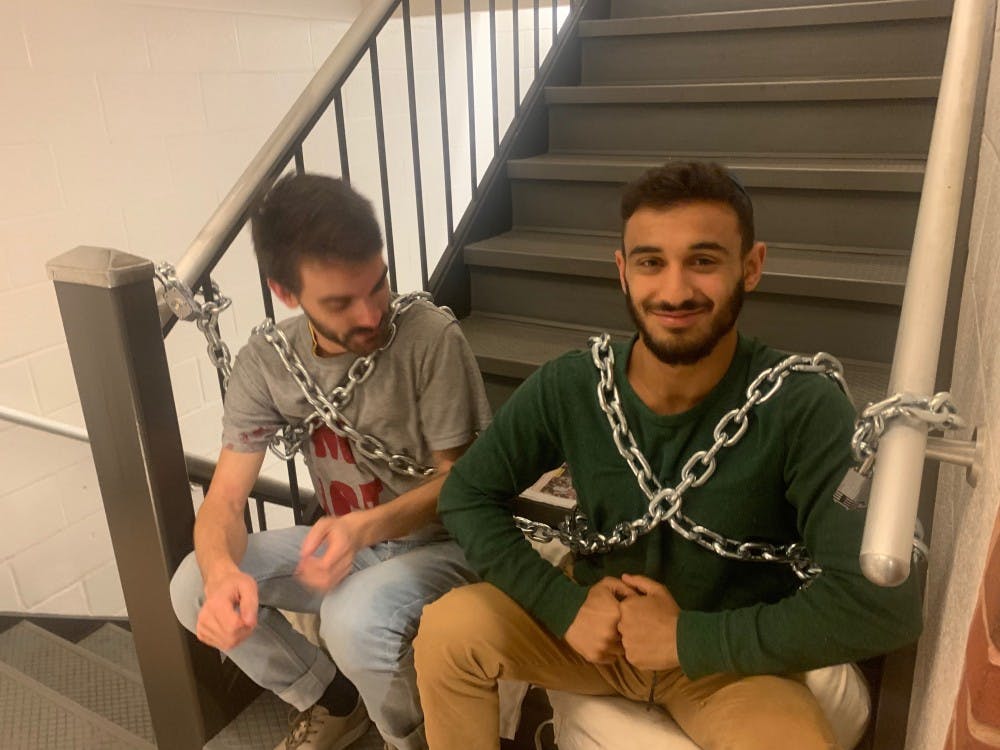Eight students chained themselves to the stairwells in Garland Hall around 4 p.m. on Wednesday, May 1.
Students and community members began the sit-in at Garland Hall on April 3 to protest the proposed private police force and the University’s contracts with Immigration and Customs Enforcement (ICE). As of press time, the sit-in reached its 30th day.
The protesters hope to finally meet with University President Ronald J. Daniels and Provost Sunil Kumar to discuss their demands. They believe that the extreme act of chaining themselves to the building will force the administration to begin negotiations.
Hopkins Coalition Against ICE (HCAI) member Adela Chelminski has been involved the sit-in since the first day. She explained to The News-Letter that the protesters felt ignored by the administration and that continual demands for negotiations were rebuffed.
“We are staying here through finals, and we are staying here through the summer if need be. Our number one demand is negotiations with the administration with an impartial mediator,” she said. “Until then we’re not going anywhere. The administration can easily get us to unchain ourselves.”
Nicki Stachowiak, Baltimore community member and HCAI member, spoke to The News-Letter about why they decided to protest in this way.
“After a series of administrative rebuffs, belittlings and threats this was really the next step because it’s really clear that the administration does not take us seriously, especially considering the end of the semester is right on the horizon,” she said.
By blocking key stairwells and the escalator, the protesters hoped to increase their presence in Garland Hall. Though they have engaged in a sit-in for four weeks, Chelminski argued that blocking passage to Kumar and Daniels’ office would potentially shut down the building and be a more effective method of getting administrators to negotiate.
By the time these students chained themselves to the stair railings, many of the offices on the second and third floors were already closed for the day. However, some people still came to Garland to use its facilities, such as the Student Disabilities Services office.
In response to this, Chelminski believes that both students and administration should be affected by their protest and that the protest needs University-wide attention.
“While we understand that some students may be affected by not being able to access these offices, it’s important for us to shut business down. We need the attention of the University, the administration and students as well,” she said.
Several Hopkins students have expressed their support for the sit-in and wish that administrators such as Daniels and Kumar would take more notice of the protesters’ efforts.
Sophomore Caleigh Roach was in one of the offices in Garland Hall as the protest was happening and witnessed the students chain themselves. Roach supports the protesters and hopes that the demonstration will have the intended effect.
“Since nothing else has worked so far, we don’t really know what will be effective — at this point, we need to try anything,” she said. “I think that we can’t really count on the administration for any results at this point. I think it’s the most effort they can put out at this moment. I don’t really know what else we can do.”
Community members and students have donated food and supplies to the sit-in.
In order to maintain a continual presence, student protesters take turns sleeping in Garland Hall.
Sophomore Colten Fisher thinks that Daniels and other administrators have not gone far enough in addressing student voices regarding the private police force.
“I believe that each and every student should deserve the right to be heard. President Daniels has not done enough to advocate for, or merely even acknowledge the concerns of the students he presides over,” he said.
In an email to The News-Letter, Daniels responded to the sit-in at Garland.
“Though we disagree with both the tactics and the substantive position of the protesters, we have permitted them to stage a sit-in in the Garland Hall lobby, but insisted that they take no actions that threaten the safety and security of others, nor disrupt the university’s mission,” he wrote. “Having said that, there will be very significant opportunities for students’ continued input an influence over how the department is built.”
The members of the sit-in chose to chain themselves to staircases in the building in order to coincide with May Day, which socialists and communists have named as International Workers’ Day and the 300th West Wednesday.
West Wednesdays are organized by Tawanda Jones and the West Coalition in remembrance of Jones’ brother Tyrone West, a black Baltimore resident who died in police custody in 2013.
Officers of the Baltimore Police Department and the Morgan State Police Department were implicated in West’s death.
Since the beginning, community members have expressed their support for the student protesters occupying Garland Hall. Jones has routinely visited the sit-in.
Recently, members renamed on of the rooms in honor of her deceased brother West and many have been participating in Jones’ West Wednesdays for the past four weeks of the sit-in.
Daniel Hellerback lives in Baltimore and has been participating in every Jones’ West Wednesdays for the past couple years.
After participating in the rally on Wednesday, he visited Garland Hall to support the protest.
He believes that the sit-in and West Wednesdays are connected since the private police force will have jurisdiction across the city and the increased militarization will affect Baltimore communities.
“What happened to Tyrone West will happen to someone else. The more police we have, the more they are armed and militarized, the more chances that this will happen to someone else,” he said.
Hellerback advocated for alternative solutions to a private police force.
“We need to be spending money on community organizations, employment and housing,” he said. “These things will make the community a better place to live.”
Rudy Malcom has written an Opinions piece on the sit-in. He did not contribute to writing or reporting for this piece.





